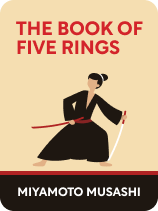

This article is an excerpt from the Shortform book guide to "The Book of Five Rings" by Miyamoto Musashi. Shortform has the world's best summaries and analyses of books you should be reading.
Like this article? Sign up for a free trial here .
What is Miyamoto Musashi’s Book of Fire chapter about? What advice does Musashi give to samurai warriors in training?
In The Book of Five Rings by Miyamoto Musashi, the Book of Fire chapter teaches samurai warriors how to apply the teachings of the previous two chapters (the Ground Book and the Water Book). Specifically, Musashi teaches three key principles that are necessary for facing enemies in combat.
Let’s take a look at how each of these principles works in practice.
Fighting Both Individuals and Armies
Having introduced the core mental and physical training necessary for success, The Book of Five Rings now turns its attention to the Book of Fire, Miyamoto Musashi’s instructions for applying this training when engaged in combat. When faced with a real-life challenge or enemy, the warrior must keep three key principles in mind:
- Awareness and adaptability
- The essentiality of always taking the initiative
- Learning how to apply strategies on both large and small scales
(Shortform note: The Fire Book has many passages centered upon particular sword fighting moves and strategies for landing blows on your opponent’s body. We have chosen not to deal directly with such passages to keep the focus on more generally applicable principles. For readers interested in learning more about the technicalities of Musashi’s sword-wielding strategies, The Martial Artist’s Book of Five Rings by Steven F. Kaufman may be helpful.)
1. Maintain Awareness and Adaptability
Musashi warns that many people make the mistake of becoming set and narrow-minded in their ways. When faced with real-life challenges, they jeopardize their chances of success by failing to optimize the strategies they have developed. No matter how knowledgeable or experienced a warrior may be, he must always keep the following rules in mind to win in combat.
Rule #1: Know Your Environment
Musashi says that awareness is the defining factor in maintaining control of a difficult situation. Take note of everything in your environment that could help or hinder you, and adjust your plans accordingly to maximize your advantages. This requires keeping in mind the difference between perception and sight as discussed in The Water Book: It is not enough just to passively see things; you must constantly perceive things and weigh what you are observing when planning your methods of attack. For a warrior, this means actively taking note of any relevant aspects of the battleground’s terrain, the positioning of the enemy, and other conditions of climate and logistics that could affect the combat.
Rule #2: Think Like Your Competitor
Musashi observes that it’s not enough to know your own goals and strategies inside and out: The mark of a true champion is the ability to think about things from the competitor’s point of view. Learning to think like the enemy enables you to anticipate potential tactics the enemy might use, while also making it easier to evaluate your own position more objectively. Musashi describes this ability to see things from the enemy’s point of view as a form of infiltration, both literally and figuratively. On a figurative level, you infiltrate by getting a sense of what the enemy is going to do and why, and what his strengths and weaknesses are. On a literal level—in terms of real-world combat—you can sometimes disorient and rout the enemy by blending in and taking him by surprise.
Rule #3: Adapt Your Strategy to the Circumstances
Musashi has nothing but disdain for “one-trick ponies.” In practical terms, this means that if you discover one tactic isn’t working during combat, you must immediately switch to a different strategy. Using the same tactic again after it has already failed to achieve the desired results is a waste of time and energy, and jeopardizes final victory.
| Becoming More Adaptable In urging readers to know their environment, think like their competitor, and adapt their strategy to the circumstances, Musashi demonstrates that adaptability is, fundamentally, a certain type of mindset that is applicable to all three areas. Some experts claim there are certain qualities that determine how adaptable a person will be. Further, adaptability has become increasingly important in today’s changing economy, especially with the rise of remote work. By cultivating the right mindset, anyone can learn to be more adaptable through putting these behaviors into practice: Be flexible. Voluntarily change up your routines and habits from time to time instead of falling into the same old patterns. Remain open to networking, taking on new tasks, and changing the way you apply your skills. Stay curious. Seek to know more about your chosen profession or a subject that interests you. Read a book or article, take a course, or practice a new hobby or skill. Focus on opportunities. Even challenges or failures hold the possibility for new opportunities within them. When faced with an obstacle or failure, ask yourself what you have learned from your past experiences, what you could have done differently, and how you could use your new knowledge to benefit yourself in the future. Work well with others. Learn how to accept constructive criticism with grace, and be tactful when offering it to others. Always be willing to compromise if the situation demands it. Be proactive. Take charge of your life and career by being active instead of passive. Network, upgrade your skills, nurture your personal connections with others, and remain alert to opportunities. Hone your emotional intelligence. Practice empathy toward others, and seek to understand instead of judge. Respect differences of opinion and/or strategy whenever possible. Travis Bradberry and Jean Greaves point out in Emotional Intelligence 2.0 that it can literally pay off: People with high emotional intelligence make an average of $29,000 more a year than people with low emotional intelligence. Stay positive. Positive people tend to be more resilient than negative people. Cultivating gratitude, making the most of things, and focusing on the big picture can help keep you grounded and optimistic. |
2. Take the Initiative
Musashi emphasizes that the successful warrior is proactive and not reactive. The single greatest advantage you can have is to always take the initiative. For Musashi, this is one of the most crucial aspects of strategy. Musashi explains that taking the initiative in battle means waging combat on your own terms instead of on the enemy’s terms, giving you more control as a result. A warrior who has learned how to carefully perceive his environment and who demonstrates a willingness to change tactics—as discussed above—will always know the best way to gain the upper hand. Therefore, use any advantages of environment or logistics you’ve perceived to weaken and disorient the enemy, such as driving the enemy into unfavorable terrain or cornering them.
| Regain the Initiative When You’ve Lost It While Musashi says that the warrior needs to be proactive and not reactive at all times, you may nevertheless find yourself in unexpected situations from time to time. In such situations, the best response is to regroup and take back control, so that you can shift from being reactive back to proactive as quickly as possible. In a business context, here are seven steps for regaining your initiative: Practice self-care. Take care of yourself both physically and mentally through practicing healthy habits like a good sleep schedule and a balanced diet. You can weather setbacks more easily if you are already doing your best to stay healthy. Work through your emotions. Don’t repress your negative emotions. Instead, work through how you feel in a productive way by facing your feelings without letting them control you—don’t do anything impulsive just because you’re upset. Rethink your perspective. Try to see the setback as an opportunity to learn something or to become better in some way. Growing wiser with experience—both good and bad—often leads to success further down the line. Use your support system. Surround yourself with family, friends, and colleagues who will support you but also help you find a way forward. Plan your comeback. Reflect upon what happened and come up with steps to recover from the setback and move forward again in your career. Put your plan into action. Start working towards recovery using manageable, smaller steps to reach your bigger goals. Reflect and learn. Ask yourself what you learned from the setback, how you could avoid a similar outcome in the future, and what you can do to improve moving forward. Become Proactive Stephen Covey lists being proactive as his first “habit” in The 7 Habits of Highly Effective People. Covey argues that people who are proactive are happier and more successful in life, because feeling in control allows you to respond more calmly to setbacks and to learn more readily from failure. Being proactive also boosts overall mental well-being and motivation, which in turn increases your chances of success. Covey argues that learning to understand what you can and can’t control, learning from mistakes, and actively shaping your self-image are all strategies you can use to become more proactive in your life. |
3. Apply Strategy on Both Large and Small Scales
In the Ground Book, Musashi argued that one of the fundamentals of the Way is flexibility of mind: the ability to adapt to any situation. Here in the Fire Book, this flexibility is presented in a new light: Musashi argues that a truly solid strategy works on both large and small scales in combat, which is why a warrior trained in the true Way will be able to apply his knowledge and skills regardless of what sort of battle he fights. Musashi urges his reader to always keep this in mind while training and even in one-to-one combat: The strategies that can help you win against one man can help you win against a whole army.
Furthermore, developing strategies applicable to any situation renders the warrior less vulnerable because his success is not context-specific: Instead, he has principles and techniques at the ready that can be deployed at will.
| Maintaining Flexibility in Business An article for the Harvard Business Review notes that flexibility isn’t just about mindset or strategy, but also about execution. So it’s important to recognize common pitfalls that can interfere with executing your plans effectively: Busyness over effectiveness. Making plans that are too complex or getting too bogged down in details can cause you to become distracted from your ultimate goal. Relying too much on measurements/data. Not everything that is valuable can be quantified. Some goals require more open-ended thinking and approaches. Refusal to adapt plans. Plans need to be flexible—any plan that is too rigid won’t serve you well if your circumstances change. Not learning from small-scale outcomes. Even the smaller steps of a plan lead to either success or disappointing results. Oftentimes these outcomes can provide valuable lessons on how to better reach the larger goal. Too many steps. While breaking large goals down into smaller, more manageable steps is often a good thing, creating plans with too many steps can sometimes slow you down too much or lead you on a tangent away from your larger goal. Not seeing the bigger picture. If you don’t think holistically and keep the bigger picture in mind, you might end up doing something that appears to work well on a small scale or in the short term, but which leads to long-term damage to your goal. Having a “one-size-fits-all” approach. Types of execution that may work well for one business might not work as well for another. Determine what is best for your unique needs. Being too practical instead of visionary. While being pragmatic can be a good thing, keep your eye out for new opportunities and changing circumstances. Businesses that get too set in their ways might not realize when changing their execution or focus is necessary for their continuing success. |

———End of Preview———
Like what you just read? Read the rest of the world's best book summary and analysis of Miyamoto Musashi's "The Book of Five Rings" at Shortform .
Here's what you'll find in our full The Book of Five Rings summary :
- Insights from the famous Samurai Miyamoto Musashi about the Way of the Warrior
- How to apply Musashi’s teachings to your personal and professional lives
- Why success is not based on brute strength or innate talent






